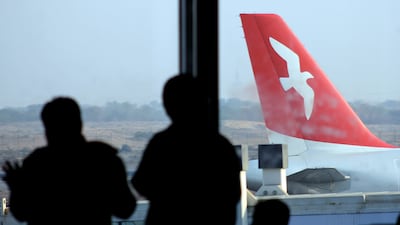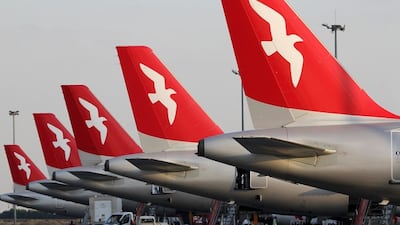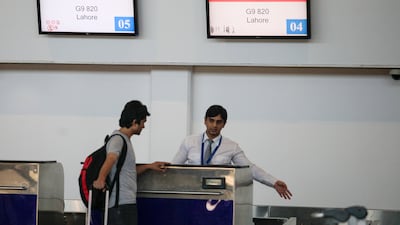Air Arabia is leasing aircraft to boost capacity as it awaits the delivery of the Airbus A320 Neos it has on order, with the first of these expected to arrive in the second half of 2025, followed by longer-range Airbus A321 XLRs in 2027.
Delivery of the airline's 120 Airbus A320-family aircraft has been postponed partly because of supply chain issues and partly on the carrier’s request as it awaits the next-generation CFM Leap engines that will be ready by early next year, said Adel Ali, group chief executive of Air Arabia.
“We have not got delivery of any of our 120 planes, thanks to [original equipment manufacturers, which] nowadays are a little slower than before,” Mr Ali told the Routes World conference in Bahrain. “We've been leasing quite a lot of aeroplanes from the market to grow the business.” He did not give any specifics on the leases.
“We decided to delay until late 2024. And the reason for that is we're waiting for the next-generation of the engines, the [CFM] Leap, that will probably come by the end of this year or early next year. There has been some delay, which will probably mean our first delivery will be in the second half of 2025.”
History of Air Arabia – in pictures
The all-Airbus operator currently has a fleet of 85 narrow-body planes. Its order of 120 planes, placed during the Dubai Airshow in 2019 and worth $14 billion at list prices, is a combination of 73 A320 Neos, 27 A321 Neos and 20 A321 XLRs.
The first of the A320 Neos is likely to be used at one of Air Arabia’s bases in the UAE, either in Sharjah or Abu Dhabi, as it phases out the older classic A320 models, Mr Ali told The National on the sidelines of the conference. “It’s a newer aeroplane, it saves us 15 per cent fuel … it helps naturally with sustainability with this fuel burn and all together it is much better customer comfort,” he said.
Meanwhile, the first of Air Arabia’s A321 XLRs is expected to join its fleet in 2027 and the airline will monitor how the plane performs with other operators. “We don't normally race to be the first people to operate an aeroplane. I’d rather have another airline try and test it and, if they work well, then we get to use them,” Mr Ali said.
The airline has no plans to use the A321 XLR for transatlantic flights, even though the aircraft has the range to do so, Mr Ali said. The plane will open up new markets for Air Arabia within an 8.5-hour flying range, extending its current range of about seven hours, he added.
“We already started operating from the UAE into places like Italy, Poland, Thailand and Malaysia,” Mr Ali said. “So it will give us many more places to fly to beyond these into South-east Asia, Europe, China. It gives us all those opportunities.”
“From here [the Middle East], it will take us all the way to much further east, almost into South Africa and anywhere in Europe … Egypt has a lot of potential that we have not tapped yet.”
The executive also said there are no immediate plans to open bases beyond the six it has in Ras Al Khaimah, Sharjah, Abu Dhabi, Morocco, Egypt and Pakistan that have further growth potential. “It’s not the right time,” Mr Ali said. “We are busy with supply chain issues, geopolitical issues. We need to develop still more opportunities in Abu Dhabi and Sharjah.”
Asked about the impact of the conflicts in Gaza and Lebanon on the airline's operations, Mr Ali said: “It's not been easy, it's been challenging, but it's still manageable.”
“You've got to make sure that you use safe [air] corridors in co-ordination between us and the authorities in all the countries. Everybody is making sure that you only open the corridors that are safe.” There is no “material impact” on the airline from the situation, he added.
Concerns over the regional conflict have prompted international airlines to suspend flights to the region or to avoid affected air space.
















